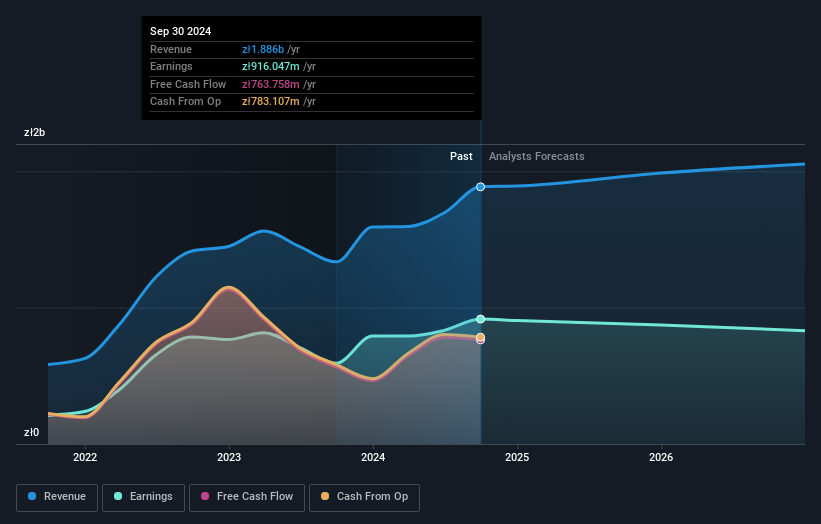- Poland
- /
- Capital Markets
- /
- WSE:XTB
XTB S.A.'s (WSE:XTB) market cap increased by zł254m, insiders receive a 51% cut

Key Insights
- XTB's significant insider ownership suggests inherent interests in company's expansion
- Jakub Zablocki owns 51% of the company
- Institutional ownership in XTB is 14%
To get a sense of who is truly in control of XTB S.A. (WSE:XTB), it is important to understand the ownership structure of the business. With 51% stake, individual insiders possess the maximum shares in the company. Put another way, the group faces the maximum upside potential (or downside risk).
Clearly, insiders benefitted the most after the company's market cap rose by zł254m last week.
Let's take a closer look to see what the different types of shareholders can tell us about XTB.
Check out our latest analysis for XTB

What Does The Institutional Ownership Tell Us About XTB?
Institutions typically measure themselves against a benchmark when reporting to their own investors, so they often become more enthusiastic about a stock once it's included in a major index. We would expect most companies to have some institutions on the register, especially if they are growing.
As you can see, institutional investors have a fair amount of stake in XTB. This implies the analysts working for those institutions have looked at the stock and they like it. But just like anyone else, they could be wrong. It is not uncommon to see a big share price drop if two large institutional investors try to sell out of a stock at the same time. So it is worth checking the past earnings trajectory of XTB, (below). Of course, keep in mind that there are other factors to consider, too.

XTB is not owned by hedge funds. The company's largest shareholder is Jakub Zablocki, with ownership of 51%. This essentially means that they have extensive influence, if not outright control, over the future of the corporation. Towarzystwo Funduszy Inwestycyjnych PZU SA is the second largest shareholder owning 1.8% of common stock, and Allianz Asset Management GmbH holds about 1.5% of the company stock.
While studying institutional ownership for a company can add value to your research, it is also a good practice to research analyst recommendations to get a deeper understand of a stock's expected performance. There is a little analyst coverage of the stock, but not much. So there is room for it to gain more coverage.
Insider Ownership Of XTB
The definition of company insiders can be subjective and does vary between jurisdictions. Our data reflects individual insiders, capturing board members at the very least. Management ultimately answers to the board. However, it is not uncommon for managers to be executive board members, especially if they are a founder or the CEO.
Most consider insider ownership a positive because it can indicate the board is well aligned with other shareholders. However, on some occasions too much power is concentrated within this group.
It seems that insiders own more than half the XTB S.A. stock. This gives them a lot of power. That means insiders have a very meaningful zł4.4b stake in this zł8.5b business. Most would argue this is a positive, showing strong alignment with shareholders. You can click here to see if they have been selling down their stake.
General Public Ownership
The general public-- including retail investors -- own 35% stake in the company, and hence can't easily be ignored. This size of ownership, while considerable, may not be enough to change company policy if the decision is not in sync with other large shareholders.
Next Steps:
While it is well worth considering the different groups that own a company, there are other factors that are even more important. Case in point: We've spotted 2 warning signs for XTB you should be aware of, and 1 of them is a bit unpleasant.
If you are like me, you may want to think about whether this company will grow or shrink. Luckily, you can check this free report showing analyst forecasts for its future.
NB: Figures in this article are calculated using data from the last twelve months, which refer to the 12-month period ending on the last date of the month the financial statement is dated. This may not be consistent with full year annual report figures.
New: AI Stock Screener & Alerts
Our new AI Stock Screener scans the market every day to uncover opportunities.
• Dividend Powerhouses (3%+ Yield)
• Undervalued Small Caps with Insider Buying
• High growth Tech and AI Companies
Or build your own from over 50 metrics.
Have feedback on this article? Concerned about the content? Get in touch with us directly. Alternatively, email editorial-team (at) simplywallst.com.
This article by Simply Wall St is general in nature. We provide commentary based on historical data and analyst forecasts only using an unbiased methodology and our articles are not intended to be financial advice. It does not constitute a recommendation to buy or sell any stock, and does not take account of your objectives, or your financial situation. We aim to bring you long-term focused analysis driven by fundamental data. Note that our analysis may not factor in the latest price-sensitive company announcements or qualitative material. Simply Wall St has no position in any stocks mentioned.
About WSE:XTB
XTB
Provides ETF, currency derivatives, commodities, indices, stocks, and bonds brokerage services in Central and Eastern Europe, Western Europe, Latin America, and the Middle East.
Outstanding track record and good value.


